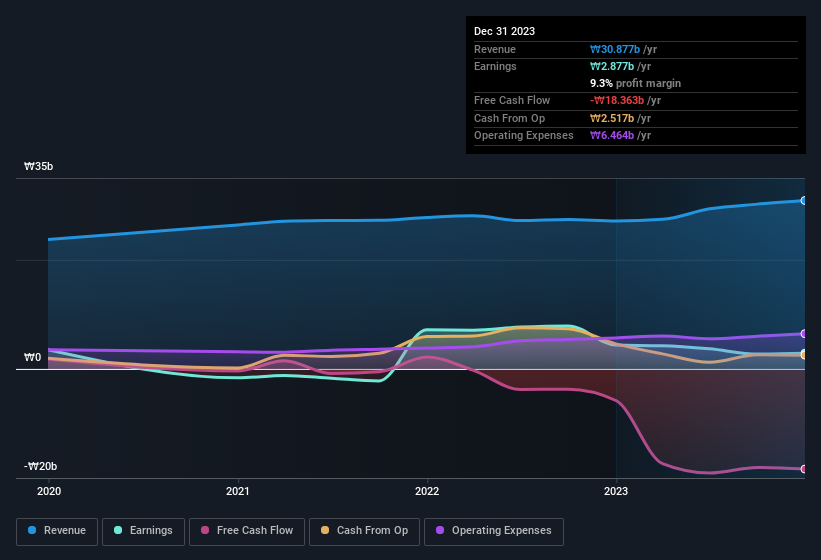- South Korea
- /
- Healthcare Services
- /
- KOSDAQ:A299170
Earnings Troubles May Signal Larger Issues for WSI (KOSDAQ:299170) Shareholders
A lackluster earnings announcement from WSI Co., Ltd. (KOSDAQ:299170) last week didn't sink the stock price. Our analysis suggests that along with soft profit numbers, investors should be aware of some other underlying weaknesses in the numbers.
View our latest analysis for WSI

A Closer Look At WSI's Earnings
As finance nerds would already know, the accrual ratio from cashflow is a key measure for assessing how well a company's free cash flow (FCF) matches its profit. To get the accrual ratio we first subtract FCF from profit for a period, and then divide that number by the average operating assets for the period. You could think of the accrual ratio from cashflow as the 'non-FCF profit ratio'.
As a result, a negative accrual ratio is a positive for the company, and a positive accrual ratio is a negative. That is not intended to imply we should worry about a positive accrual ratio, but it's worth noting where the accrual ratio is rather high. To quote a 2014 paper by Lewellen and Resutek, "firms with higher accruals tend to be less profitable in the future".
WSI has an accrual ratio of 0.68 for the year to December 2023. Statistically speaking, that's a real negative for future earnings. And indeed, during the period the company didn't produce any free cash flow whatsoever. Over the last year it actually had negative free cash flow of ₩18b, in contrast to the aforementioned profit of ₩2.88b. Coming off the back of negative free cash flow last year, we imagine some shareholders might wonder if its cash burn of ₩18b, this year, indicates high risk.
Note: we always recommend investors check balance sheet strength. Click here to be taken to our balance sheet analysis of WSI.
Our Take On WSI's Profit Performance
As we have made quite clear, we're a bit worried that WSI didn't back up the last year's profit with free cashflow. For this reason, we think that WSI's statutory profits may be a bad guide to its underlying earnings power, and might give investors an overly positive impression of the company. In further bad news, its earnings per share decreased in the last year. The goal of this article has been to assess how well we can rely on the statutory earnings to reflect the company's potential, but there is plenty more to consider. With this in mind, we wouldn't consider investing in a stock unless we had a thorough understanding of the risks. For example, WSI has 3 warning signs (and 1 which is potentially serious) we think you should know about.
Today we've zoomed in on a single data point to better understand the nature of WSI's profit. But there are plenty of other ways to inform your opinion of a company. For example, many people consider a high return on equity as an indication of favorable business economics, while others like to 'follow the money' and search out stocks that insiders are buying. So you may wish to see this free collection of companies boasting high return on equity, or this list of stocks that insiders are buying.
Valuation is complex, but we're here to simplify it.
Discover if WSI might be undervalued or overvalued with our detailed analysis, featuring fair value estimates, potential risks, dividends, insider trades, and its financial condition.
Access Free AnalysisHave feedback on this article? Concerned about the content? Get in touch with us directly. Alternatively, email editorial-team (at) simplywallst.com.
This article by Simply Wall St is general in nature. We provide commentary based on historical data and analyst forecasts only using an unbiased methodology and our articles are not intended to be financial advice. It does not constitute a recommendation to buy or sell any stock, and does not take account of your objectives, or your financial situation. We aim to bring you long-term focused analysis driven by fundamental data. Note that our analysis may not factor in the latest price-sensitive company announcements or qualitative material. Simply Wall St has no position in any stocks mentioned.
About KOSDAQ:A299170
Slight risk with imperfect balance sheet.
Market Insights
Community Narratives




